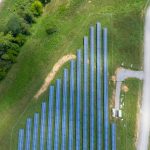Surety Bond Professionals is a family owned and operated bonding agency with over 30 years of experience. With access to a broad range of surety markets, our expert agents are ready to assist with all of your construction bond needs.
What Is the Road Forward?
The National Asphalt Pavement Association (NAPA) represents the interests of companies producing asphalt pavement material, interacting with Congress, various government agencies, and other trade associations. NAPA provides thought leadership and research that helps the industry develop and employ sustainably produced asphalt paving materials.
NAPA established The Road Forward initiative with the goal of the asphalt industry achieving net-zero carbon emissions by 2050. Partnering with NAPA member organizations brings insights and fresh perspectives to the effort to reduce scope 1 carbon emissions generated in the process of producing asphalt paving materials. NAPA established member-partnerships with these three producers in 2022:
- Summit Materials, based in Denver, Colorado—a NAPA member since 2010,
- Kokosing Materials, based in Columbus, Ohio—a NAPA member since 1985,
- Kraton Corporation, based in Houston, Texas—a NAPA member since 2011
Both Summit and Kokosing produce asphalt paving mix, aggregates, and other paving materials. Kraton produces polymers used to modify asphalt binders used in paving and roofing. All three were actively involved in efforts to reduce carbon emissions and increase sustainability in their own businesses and in the asphalt paving industry prior to signing on to NAPA’s The Road Forward initiative.
Move Toward Renewable Energy
Increasingly, companies like NAPA’s member-partners are transitioning to renewable energy sources to power their production operations. In fact, many businesses and homeowners are shifting to renewable energy, and communities and states across the country are establishing sustainability standards and goals to reduce embodied carbon and curb carbon emissions into the atmosphere. It’s estimated that about half of all new electric generating capacity in the coming year will be powered by solar energy.
Implications for the Construction Industry
Green building is rapidly becoming the norm in anticipation of the impact of climate change. Architects, designers, and builders are rethinking traditional building practices and materials. Sustainability requirements are being written into construction contracts. And a proven ability to minimize a structure’s carbon footprint is key to the growth and long-term success of construction companies.
Builders will need to adapt to the changing bonding requirements in the rapidly evolving construction industry. Most are familiar with the bid bonds, performance bonds, and payment bonds required for most government-funded construction projects and by an increasing number of private project owners, particularly in the commercial sector. Contractor license bonds, maintenance bonds, subdivision bonds, and a number of other construction bonds are also relatively commonplace and familiar to most contractors.
Solar construction bonds are less common, and many contractors have little experience with them. Among the most common of these are solar power performance bonds, maintenance bonds, and decommissioning bonds. Right of way bonds and customs bonds are less commonly required for projects involving the installation of solar panels or solar generating systems, but are nonetheless important for builders to know about.
Solar Power Performance Bonds
Solar power performance bonds function much like traditional performance bonds. A solar power performance bond is a guarantee that the builder purchasing it will complete the project according to the contract with the project owner. The bond provides financial protection for the project owner if the contractor fails to complete the job and other arrangements must be made to finish the work.
Maintenance Bonds
In purchasing a solar maintenance bond, a contractor is guaranteeing to maintain and service the solar energy system after installation is complete. Failure to do so can result in the project owner filing a claim for monetary damages. Solar maintenance bonds are also referred to as solar operations bonds.
Decommissioning Bonds
Contractors building larger solar generating facilities are often required to furnish the project owner with a decommissioning bond (also referred to as a restoration bond). A decommissioning bond is the builder’s guarantee to remove the solar system components and restore the site to its original condition when the system is no longer needed or is to be shut down permanently for some other reason. The average lifespan of such facilities is about 25 years.
Right of Way Bonds
These bonds come into play only when installing solar panels requires the contractor to perform work alongside a road, highway, sidewalk, or other public property. When this is the case, providing a Right of Way bond is a prerequisite for obtaining a state or local permit for the work. The contractor must abide by the terms of the permit and correct any damage done while installing a solar generating system.
Custom Bonds
A builder who uses imported solar panels or other imported solar energy system components may be required to purchase a customs bond. The bond is the builder’s guarantee to pay any taxes, duties, or fines owed to the U.S. government on the imported items.
Get A Quote
Our surety bond professionals will get you the construction bonds you need at a competitive rate.





